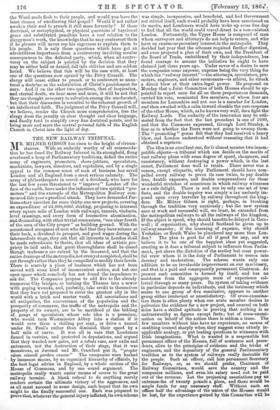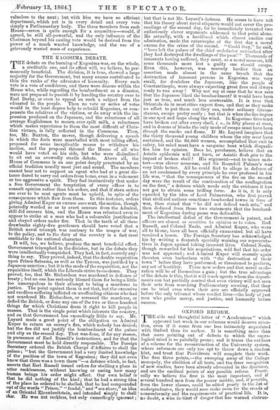THE NEW RAILWAY TRIBUNAL.
MR. MILNER GIBSON has risen to the height of circum- stances. With an audacity worthy of all commenda- tion he has faced the Railway Interest in its stronghold, flung overboard a heap of Parliamentary traditions, defied the entire army of engineers, promoters, share-jobbers, speculators, machinists, lawyers, directors, and capitalists, and by a single appeal to the common sense of men of business has saved London and all England from a most serious calamity. The army of philanthropists in search of a dividend? who have for the last few years threatened to " improve " London off the face of the earth, have under the influence of two spirited " pro- moters" and the example of the Metropolitan Railway com- menced this year a practical attack. They have demanded Par- liamentary sanction for some thirty-one new projects, covering an expenditure of 34,000,0001. sterling, proposing to intersect every square mile of London with railways, tunnels, viaducts, level crossings, and every form of locomotive abomination, pal demanding, with other trivial concessions, "one clear fourth of the area of the City proper " as building ground. With the accustomed arrogance of men who feel that they have science at their back, a dividend in prospect, and good wages during the intermediate stage, they ask that all interests in London shall be made subordinate to theirs, that all ideas of artistic pro- priety be laid aside, that great thoroughfares shall be closed though tradesmen are ruined by the thousand, and that the entire drainage of the metropolis, not even yet completed, shall be cut through rather than they be compelled to modify their levels. There is scarcely a place of business which has not been served with some kind of inconvenient notice, and but one open space which somebody has not found the impudence to ask for. The Companies propose to add five to the already numerous City bridges, so turning the Thames into a sewer with gaping wounds, and, probably, take credit to themselves that they have not proposed to cover the greatest city in the world with a brick and mortar vault. All associations and all antiquities, the convenience of the population and the prosperity of commerce, the traffic of the metropolis and the property of its owners, are to be sacrificed at the bidding of gangs of speculators whose sole idea is a premium, who would turn Westminster Abbey into a station if it would save them a shilling per cent., or drive a tunnel under St. Paul's rather than diminish their speed by a half mile of curve. It was all in vain that Londoners famed in vestries, and protested in deputations, and argued that they wanted new gates, not a tabula rasa, new exits and entrances, not the destruction of their stage, that it was monstrous, as Juvenal and Mr. Crawford put it, "propter vitam vivendi perdere causes." The companies were backed by immense means, by an organized hierarchy of officials, by the best legal advice in England, by a whole section of the House of Commons, and by one sound argument. The metropolis really wants easier means of access to the great railway termini. A blank refusal to do anything merely renders certain the ultimate victory of the aggressors, and as all must succeed in some design, each hoped that its own might be the finally successful one. Each was prepared to prove that, whatever the general injury inflicted, its own scheme was simple, inexpensive, and beneficial, and had Government not stirred itself, each would probably have been sanctioned on its merits, and Londoners would have woke up some fine day to find that all the world could travel direct to a non-existent London. Fortunately, the Upper House is composed of men whom surveyors and attorneys do not help to return, and who have an enormous pecuniary interest in the metropolis. They decided last year that the schemes required further digestion, and even proposed a plan of their own, and the President of the Board of Trade, emboldened by their independence, has found courage to assume the initiative he ought to have claimed just three years ago. Under cover of a desire to save the companies some expense, expense being the very thing for which the "railway interest"—the attorneys, speculators, pro- moters, engineers, and other cormorants—is athirst, he struck a direct blow at their extra-legal power. He proposed on Monday that a Joint Committee of both Houses should be ap- pointed to report once for all on these preposterous demands, carried his vote, nominated five members, of whom four are members for Lancashire and not one is a member for London, and then awaited with a calm inward chuckle the sure response of the other House, which, as he knows very well, dare fight the Railway Lords. The audacity of the innovation may be esti- mated from the fact that the last precedent is one of 1690, and that the Commons expressed, through Lord Stanley, a fear as to whether the Peers were not going to swamp them. The " promoting " genus felt that they had received a heavy blow, and London understood without reasoning that it had obtained a reprieve.
The idea is an excellent one, for it almost secures two incom- patible objects—a tribunal which can decide on the merits of vast railway plans with some degree of speed, cheapness, and consistency, without destroying a power which, in the last, resort, Parliament does well to retain. There never was a reason, except etiquette, why Parliament should have com- pelled every railway to prove its case twice, to pay doable fees, double expenses, and double compensations for those wonderful stretches of conscience in which railway witnesses as a rule delight. There is and can be only one set of true facts, and the double inquiry was simply a tax uselessly im- posed upon every traveller by railway throughout the king- dom. Mr. Milner Gibson is right, perhaps, in breaking through the tradition very cautiously ; but the new system once at work and successful will, we trust, be extended from the metropolitan railways to all the railways of the kingdom. If the object is speed, why should benefits be delayed in Corn- wall ; if organization, why should Scotland be given up to railway anarchy; if the lessening of expense, why should Yorkshire or South Wales be plundered any more than Lon- don ? The plan is good for all if good for any, and we believe it to be one of the happiest ideas yet suggested, creating as it does a tribunal subject to influence from Parlia- ment, yet above the dictation of the motley but most power ful crew whom it is the duty of Parliament to coerce into decency and moderation. The scheme wants only one addition to be an invaluable improvement on our machinery, and that is a paid and consequently permanent Chairman. At present each committee is formed by itself, and has no assistance from the aggregate mass of experience col- lected through so many years. Its system of taking evidence in particular depends on individuals, and the testimony which seems to one group of five conclusive, appears to another group either irrelevant or unsatisfactory. Of cross-examina- tion there is often plenty when one acute member desires to- pulverize the evidence for a new project, and counsel on both sides have a skilled aptitude in proving that nothing is so untrustworthy as figures except facts ; but of cross-exami- nation on behalf of the nation there is seldom a trace. The few members without bias have no experience, no means of snubbing counsel sharply when they suggest some utterly in- applicable analogy, or put leading questions to witnesses with Irish imaginations. What is wanted is a responsible but permanent officer of the Houses, full of acuteness and prece- dents, alive to the principles of evidence and the tricks of engineers, and the depository of the general Parliamentary tradition as to the system of railways really desirable for the people. Such an officer, call him permanent Secretary for Railways, or, as we should prefer, Chairman of Railway Committees, would save the country and the companies millions, and even his salary need not be paid out of the revenue. Let the projecting associations pay an entrance-fee of twenty pounds a piece, and there would be ample funds for any necessary staff. Without such an officer half the advantage of the union of the Houses would be lost, for the experience gained by this Committee will be valueless to the next ; but with him we have an efficient department, which yet is in every detail and every vote simply a Parliamentary body. The three 'members from each House—seven is quite enough for a committee—would, if agreed, be still all-powerful, and the only influence of the Chairman beyond his casting vote would be derived from the power of a much wanted knowledge, and the use of a grievously wasted mass of experience.































 Previous page
Previous page